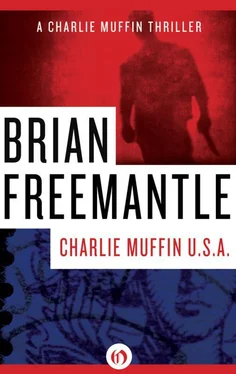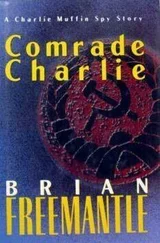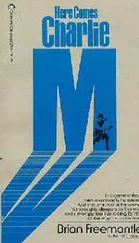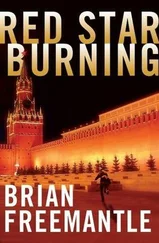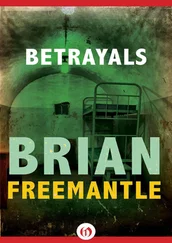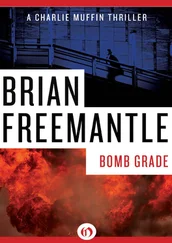Brian Freemantle - Charlie Muffin U.S.A.
Здесь есть возможность читать онлайн «Brian Freemantle - Charlie Muffin U.S.A.» весь текст электронной книги совершенно бесплатно (целиком полную версию без сокращений). В некоторых случаях можно слушать аудио, скачать через торрент в формате fb2 и присутствует краткое содержание. Жанр: Шпионский детектив, на английском языке. Описание произведения, (предисловие) а так же отзывы посетителей доступны на портале библиотеки ЛибКат.
- Название:Charlie Muffin U.S.A.
- Автор:
- Жанр:
- Год:неизвестен
- ISBN:нет данных
- Рейтинг книги:3 / 5. Голосов: 1
-
Избранное:Добавить в избранное
- Отзывы:
-
Ваша оценка:
- 60
- 1
- 2
- 3
- 4
- 5
Charlie Muffin U.S.A.: краткое содержание, описание и аннотация
Предлагаем к чтению аннотацию, описание, краткое содержание или предисловие (зависит от того, что написал сам автор книги «Charlie Muffin U.S.A.»). Если вы не нашли необходимую информацию о книге — напишите в комментариях, мы постараемся отыскать её.
Charlie Muffin U.S.A. — читать онлайн бесплатно полную книгу (весь текст) целиком
Ниже представлен текст книги, разбитый по страницам. Система сохранения места последней прочитанной страницы, позволяет с удобством читать онлайн бесплатно книгу «Charlie Muffin U.S.A.», без необходимости каждый раз заново искать на чём Вы остановились. Поставьте закладку, и сможете в любой момент перейти на страницу, на которой закончили чтение.
Интервал:
Закладка:
Jack Pendlebury sat unmoving in a chair in his sitting room, two floors below Charlie Muffin, considering what the woman had told him. He decided that Clarissa Willoughby was stupid. And that therefore the information had been volunteered unwittingly.
He was connected to Warburger within minutes and as soon as he told the Director the reason for the call, War-burger brought Bowler on the line in a conference call.
‘Kill him,’ said Warburger immediately.
‘But at the proper time,’ argued Pendlebury, content with the idea that had come to him.
‘That’s now,’ insisted Bowler.
‘No,’ said Pendlebury. ‘My way we get an indictment for murder against Terrilli.’
14
General Valery Kalenin was a short, square-bodied Georgian considered unique within the Kremlin and therefore regarded by some with awe, by others with suspicion and by nearly everyone with respect. He had come unscathed through the Stalin era, even during the purges of the Intelligence departments which had followed Lavrenti Beria’s fall from favour and survived, too, the apparent liberalisation under Khrushchev, which in reality had been nothing of the sort. He had achieved this not by sycophancy, even in Stalin’s time when the attitude was considered essential, because he regarded sycophancy as the surest way to disaster. It had even come to as adept a toady as Beria.
Kalenin had survived by absolute and utter dedication to his job, thus creating an efficiency unparalleled in any other department of Soviet government, and because the majority of Soviet government is clogged by bureaucracy this increased his prestige.
That he was able to show such dedication was possible because of the unusual sort of person he was. A bachelor with a brilliant, calculating mind, he had absolutely no social ability, and because of some psychological quirk, which he accepted without regret because he didn’t know what he was missing, he had no sexual inclination, either male or female. This lack of interest was usually obvious to both sexes, heightening the regard in which he was held, because other men in Kalenin’s position invariably used their power for personal indulgences. Beria had actually created a squad of men to kidnap pubescent virgins off the streets of Moscow.
With virtually nothing to distract him apart from his absorption in the history of tank warfare, in which he was an acknowledged expert, Kalenin’s entire existence was devoted to the Komitet Gosudarstvennoy Bezopasnosti, and within the K.G.B. itself he was a revered figure. He worked sixteen hours a day either in their headquarters in Dzerzhinsky Square, a grey stone building which before the Revolution had belonged to the All-Russian Insurance Company, or in any of the capitals of the Warsaw Pact, of which he was over-all Intelligence commander, no matter what lip-service was made to the pretence of separate, national identity. Any surplus time was spent organising solitary war games with his toy tanks on the kitchen floor of his apartment in Kutuzovsky Prospekt and it was during this relaxation that he occasionally regretted the absence of friends. Even though he was scrupulously fair, never cheating with the dice, it was always difficult to perform as leader of both sides.
Normally something as minuscule as an anonymous telephone call to a foreign embassy would not have been forwarded for his personal attention, because Kalenin regarded delegation as an essential part of efficiency. But it was not normal for anonymous telephone callers to refer by name to the head of the K.G.B., for as with sex, Kalenin was entirely uninterested in fame or notoriety, actually going to extensive lengths to conceal his identity throughout the Eastern bloc and taking absolute care that it was not known in the West.
The report was made initially from the American capital by telex and within twenty-four hours Kalenin had demanded a full account. Because the call had lasted barely thirty seconds, there wasn’t much of it. The K.G.B. Resident in Washington had, however, included in addition a full report of the Romanov exhibition, even attaching some newspaper reviews of the display in New York.
Kalenin’s office in Dzerzhinsky Square reflected the man, a starkly bare, functional room, with a disregarded view of other offices and chancelleries within the Kremlin complex. Two days after Charlie Muffin’s contact, Kalenin sat there, quite alone, the completed file before him.
The time was long past when the government of Russia dismissed as bourgeois irrelevence the legacies of Tsarism: the treasures of the Armoury in Moscow and the Hermitage in Leningrad were actually offered as tourist attractions. The official attitude was different, of course, in the case of anything that had been taken from the country in the immediate confusion after 1917. But not very different. Because his survival depended upon such awareness, Kalenin knew there would be irritation within the Praesidium if anything were to happen to the Romanov Collection: what was Russian remained Russian, wherever it was. That knowledge would have been sufficient to provoke a reaction, but the risk to a collection of stamps was not Kalenin’s predominant concern as he sat reflectively in his sterile room. He was far more interested in the identity of a call-box user in the American State of Florida who knew his name. For that reason there was one part of the Washington report upon which Kalenin had sought clarification, and he drew the addendum towards him now. An English voice, the initial report had said. The additional information was that the expression had meant to convey there was no intonation of any foreign language. Either English or American, then. But because of the location, more likely American. A C.I.A. trap, to trick him into reaction that might get Russians involved and lead to a political embarrassment? A possibility, Kalenin supposed. But it was a very clumsy effort; too clumsy to be the strongest likelihood.
What then? Kalenin posed again the question that had occupied his mind for the past forty-eight hours and again could not offer himself an answer. The burly man sighed, closing the folder. He would have to discover the solution, he knew; that was how he had existed for so long in the position he occupied.
Even though he doubted entrapment, Kalenin knew he would have to guard against it. But because the operation was in Florida, he had already determined a way to achieve that. And in such a fashion that if the C.I.A. were involved, whatever scheme they had evolved would explode in their faces. A man who constantly planned ahead, Kalenin had had flown to Moscow fifty C.I.A.-trained Cubans within twenty-four hours of their seizure after the abortive Bay of Pigs invasion during the Kennedy administration. It had only taken three months of imprisonment to turn them. Twenty would be put into Florida, to protect the exhibition. And if the C.I.A. sprang a trap, they’d find they had caught their own men; Kalenin was sure that through the news media he covertly controlled he would be able to expose the capture and the men’s history within hours of its having occurred.
The selection of the man who would attempt to discover the identity of the mystery caller, rather than protect the exhibition, was something that required deeper consideration. There was a man, an operative who had been installed with a deep cover in the California city of San Diego and allowed to establish an outwardly respectable job and life, both of which would have defied any investigation, no matter how detailed. Kalenin hesitated from activating him, unwilling to expend such an investment. But as head of the K.G.B., his identity was officially defined as a state secret. So it followed that the knowledge and use of it from an American call box could be officially described as endangering State security.
Читать дальшеИнтервал:
Закладка:
Похожие книги на «Charlie Muffin U.S.A.»
Представляем Вашему вниманию похожие книги на «Charlie Muffin U.S.A.» списком для выбора. Мы отобрали схожую по названию и смыслу литературу в надежде предоставить читателям больше вариантов отыскать новые, интересные, ещё непрочитанные произведения.
Обсуждение, отзывы о книге «Charlie Muffin U.S.A.» и просто собственные мнения читателей. Оставьте ваши комментарии, напишите, что Вы думаете о произведении, его смысле или главных героях. Укажите что конкретно понравилось, а что нет, и почему Вы так считаете.
